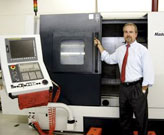
|
 |
Dayton Business Journal...
Businesses face
expiring tax reductions ahead
by Laura Englehart
Sunday, October 16, 2011
Greg Knox has first-hand knowledge of the business benefits of tax
savings. The president of Franklin-based Knox
Machinery said a tax reduction called “bonus
depreciation,” which allows companies to buy certain equipment and then
deduct 100 percent of the acquisition cost, has helped boost company
sales.
However, the tax incentive, along with a host of others, are set to
expire or be reduced at year’s end, unless Congress extends them.
The loss of these programs could cut into bottom lines of many firms,
or at the very least, slow down spending where incentives have provided
businesses a reason to buy.
“We have a lot of companies who, coming toward the end of the year,
realize that if they’ve had good, strong, profitable years, instead of
giving all that money back to Uncle Sam they can reduce their taxable
burden at the end of the year,” Knox said.
That has kept Knox Machinery busy, he said, but when Jan. 1 hits, that
could change.
Knox said the rush to purchase equipment and use it before 2011 ends
could create a void in early 2012 sales. But that shouldn’t matter
much, he said, because the tax incentives are merely accelerating buys
in a strong industry.
“Even if we do move some of our Q1 sales into Q4 2011, I still see a
very brisk manufacturing economy that shows no faltering soon,” Knox
said. “The outlook continues to be strong for the next several years.”
Though bi-partisan debate continues as to whether tax breaks and
reimbursements for businesses actually spur job creation, spending and
ultimately economic growth, companies that benefit from tax deductions
on equipment purchases will feel the loss.
The “bonus depreciation” tax deduction will drop to 50 percent in 2012,
and then expire in 2013.
Equipment has a depreciation schedule that varies in years. Typically,
businesses write off the equipment purchase evenly over that time
length, but the incentive permits business owners to deduct the entire
expense from their taxable income in the first year the equipment was
purchased, which theoretically puts more money in pockets sooner and
leaves more for businesses to spend.
“If you’re purchasing equipment with a 20-year tax life, as you can
imagine, that’s a pretty significant tax benefit,” said Kevin Simon, an
associate lawyer at Dinsmore & Shohl LLP, the
Dayton region’s second largest firm.
Another tax deduction slated for reduction allows a taxpayer to expense
up to $500,000 on up to $2 million of business property purchases. At
the end of 2011, that tax break will reduce to $125,000 on up to
$500,000 in purchases.
Combined, these tax incentives boosted fourth-quarter sales at Knox
Machinery, which sells computerized mills and lathes to machinery
manufacturers.
Knox said, when strong tax incentives like these are in place, his
company sometimes logs about 50 percent of its sales in the final
quarter.
The average sale at Knox Machinery ranges from $150,000 to $250,000.
Though these incentives provide some businesses a welcome tax break,
for them to have an impact on spending, there must first be a need,
said Philip Zukowsky, a partner in the corporate law department at
Dinsmore.
“There’s a tree of decisions that has to be made by businesses. They’re
not just going to go out and buy equipment that they don’t need,”
Zukowsky said.
Bonus depreciation can help and hurt a business, said Warren Davidson,
owner of Troy-based contract manufacturer West Troy. Though the
deduction reduces a company’s tax burden initially, it can skew profits.
“Because of tax laws like that, you wind up with this gap in what you
think your profitability is,” Davidson said.
Still, Davidson said his company has used the tax deduction when
purchasing equipment because he can invest the money saved and put it
to use down the road. He also said it does the trick in spurring
purchases that otherwise could be deferred.
Other tax credits or deductions set to expire by the end of 2011
include:
• The Work Opportunity Tax Credit, which provides employers a 40
percent tax credit, or up to $6,000 per employee, applied to wages for
workers in their first year. This credit will expire.;
• The Differential Wage Payment Credit, which applies to employers who
pay their workers while they serve a military obligation. For employees
who make less in the armed forces, some businesses cover the difference
in their regular salary. The government provides those employers a 20
percent tax credit on the differential. This credit will expire.; and
• A deduction that applies to leasehold improvements for restaurant and
retail properties. Rather than write off improvements over the average
39-year life of the property, business owners can do so over 15 years.
This deduction will expire.
Read this and other stories at Dayton Business Journal
|
|
|
|

